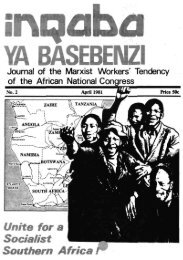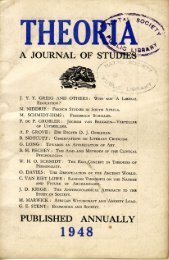Staffrider Vol.5 No.2 1982 - DISA
Staffrider Vol.5 No.2 1982 - DISA
Staffrider Vol.5 No.2 1982 - DISA
Create successful ePaper yourself
Turn your PDF publications into a flip-book with our unique Google optimized e-Paper software.
CULTURE AND RESISTANCE<br />
CYNTHIA KROSS<br />
soy^v<br />
sour<br />
so.ur x<br />
31\'<br />
3T\^<br />
IT is probably a long time since Botswana's dusty capital has<br />
known such a sense of exhiliration. Over 600 people — most<br />
of them South Africans — descended on the university for<br />
the five day Culture and Resistance Festival.<br />
People who had not seen each other for years embraced<br />
fiercely. Over and over again you could hear the poignant<br />
phrase that crops up in the conversation of all exiles, sooner<br />
or later, as they ask about things 'at home'. It gives you a<br />
start to realize that even after two decades of exile South<br />
Africa has not stopped being home.<br />
The festival was arranged to examine and propose<br />
suggestions for the role of artists in the creation of a<br />
democratic South Africa.<br />
This was done through various seminars on particular<br />
aspects of the Arts, including dance, fine art, photography,<br />
poetry, novels and drama, in conjunction with exhibitions,<br />
film shows and dramatic presentations. Each seminar was led<br />
by a panel of artists who have achieved recognition in their<br />
own field: Robin Orlin, Malcolm Purkey, James Matthews<br />
Chris van Wyk, Nadine Gordimer, Charles Mungoshi and so<br />
on.<br />
The special status that is accorded to the artist in western<br />
society was severely criticised. The term 'cultural worker'<br />
was offered as an alternative to the more prestigious 'artist'.<br />
Many of the cultural workers themselves were eager to<br />
shed the mystical cloak of artistry. James Matthews denies<br />
emphatically that he writes poetry, insisting that he merely<br />
'expresses feelings'. If you tempt him to 'express his feelings'<br />
on those who do call themselves poets, you will be treated to<br />
the unique Matthews brand of abuse.<br />
Abdullah Ibrahim (Dollar Brand) corrects anyone who<br />
calls him a musician or a pianist. He defines himself as 'the<br />
messenger boy' and recalls a saying of his that has become<br />
famous: T regard myself as a worker . . . my function is no<br />
less or more important than a street sweeper's or a doctor's.'<br />
At the end of his concerts he solemnly joins the audience<br />
in their applause to show that all praise is due to Allah alone.<br />
The seminars gave rise to some stimulating debates which<br />
were not always followed through. For example, the seminar<br />
on theatre suffered from people's unwillingness to analyse<br />
the alternative theatre that has been produced in South<br />
Africa since the 1950's. Important issues such as whether or<br />
not artists should be supported by their communities were<br />
raised but then fell flat.<br />
Similarly in the poetry seminar when someone asked why<br />
there were so few women involved in poetry, the chairperson<br />
thought that this question should be reserved for a separate<br />
session at some later date.<br />
The novel seminar was, in some ways, the most<br />
challenging. The novel was attacked and defended with equal<br />
vigour. Some of the questions raised were: Do workers have<br />
the necessary educational background and do they have the<br />
time to plough through 300 pages or so? The novel is<br />
historically a product of the middle class, can it be made to<br />
serve the workers and, — most insistent of all — does the<br />
novel tell the truth?<br />
It was unfortunate that not many people, besides Ms<br />
Gordimer, appeared to know much about the post '76<br />
renaissance which has given birth to novels like Miriam Tlali's<br />
Amandla and Mongane Serote's To Every Birth Its Blood.<br />
It was easier to resolve the position and function of<br />
poetry, despite some of the audience's unhappy school<br />
recollections. Poetry is more easily composed on the evening<br />
trian than some other forms of literature. It is read at<br />
meetings and at the gravesides of martyrs.<br />
The dominance that European poetry has enjoyed for so<br />
long in our schools and in the minds of our poets, was<br />
angrily denounced. People had it in for daffodils especially,<br />
probably justly so. What could be more foreign to African<br />
experience than a wild host of them waiting to inspire the<br />
solitary poet?<br />
There was some sense of loss though. It was reminiscent<br />
of a poem by James Matthews in which he recalls his original<br />
poetic intentions to describe natural wonders. But after<br />
having seen the dark images of oppression he writes:<br />
'i will never be able to write<br />
a poem about dawn, a bird or a bee.'<br />
One of the exiles spoke about the feelings awoken in him by<br />
the glorious sunset he had witnessed on his landing in<br />
Botswana — the closest he had come to his home for twenty<br />
years. The point that emerged from this was that subjects of<br />
natural beauty should not be denied to poets. They will<br />
inevitably be imbued with a certain consciousness whether it<br />
is Wordsworthian wonder or the longing, bitterness and hope<br />
of the exile.<br />
When Abdullah Ibrahim found himself trapped in a press<br />
conference he refused to clarify the political 'message' of his<br />
music. The spectacle of the journalists, each jostling in his or<br />
her own 'groove', as he put it, amused him. He would not be<br />
drawn into any of the 'grooves'.<br />
'The human spirit recognises the quality that is injected<br />
through the music,' he said. He suggested that this contributes<br />
to the jidha (holy war) that is waged with the self. It<br />
is necessary for each individual to re-orientate himself before<br />
society as a whole can be transformed. 'After all', he<br />
maintained, 'it's no good shooting if you shoot in the wrong<br />
direction.'<br />
It seems he does not have to be consciously aware of his<br />
duty to the people. T am the people,' he asserted.<br />
The journalists continued to refer to the theme of the<br />
festival. Ibrahim said: 'After all the killings and everything<br />
. . . It's <strong>1982</strong> and we still have to tell the culture to resist!'<br />
Nevertheless, he added that he thought the Festival was a<br />
'useful exercise'.<br />
He seemed to be suggesting that the conscientised cultural<br />
worker may be sensitive to the troubles and hopes of the<br />
people without having to analyse them scientifically in the<br />
way that a sociologist might. If the cultural worker presents<br />
his or her perceptions effectively the individuals in the<br />
audience instinctively recognise and respond to them on<br />
different levels.<br />
STAFFRIDER, VOL. 5 NO. 2, <strong>1982</strong> 11
















